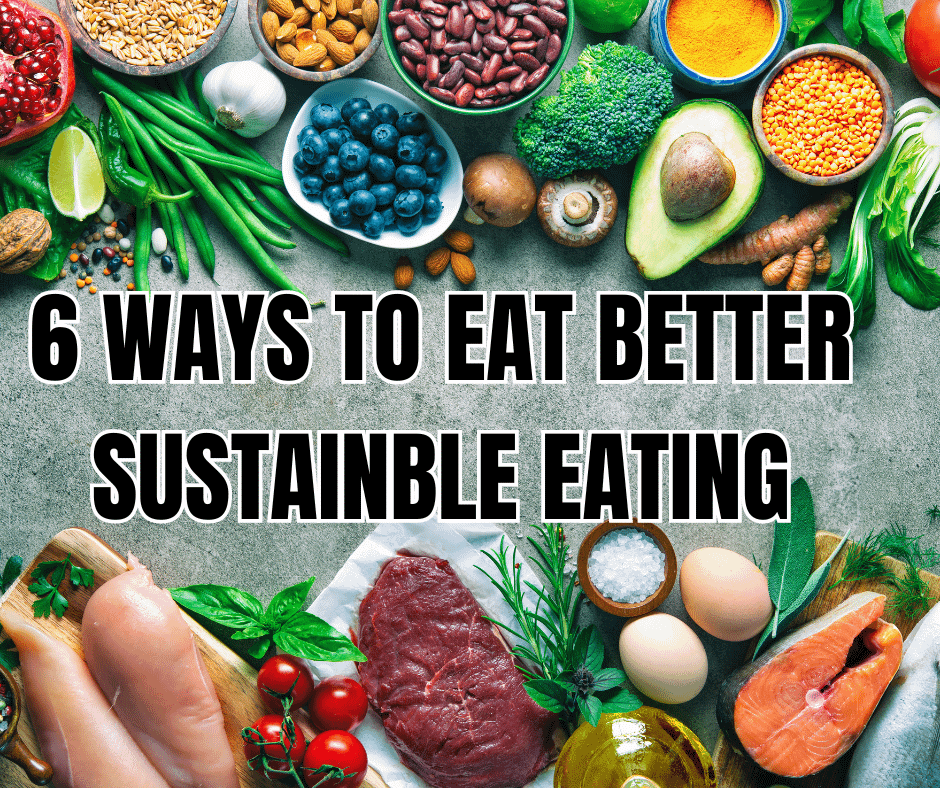Sustainable Eating: 6 Ways to Eat Better and Help the Planet.

We all eat; however, how we eat can significantly impact the environment, our health, and the economy. Welcome to the world of sustainable eating. This guide will look at simple ways people can make better food choices for themselves and the environment.
What Is Sustainable Eating?
Core Principles and Definition
Eating more sustainably means choosing foods that are good for human health and the environment’s well-being. This means that ingredients will have to be grown and harvested in ways that protect ecosystems, reduce carbon emissions, and use less water and energy. It is centred on this tripod of eating a more plant-based diet, creating less waste, and supporting more ethical farming.
Buying locally results in less transportation and thus fewer emissions, whereas reducing food waste saves land and water.
Such sustainable diets are typically rich in fruits, vegetables, whole grains, and legumes, which lowers the risk of developing heart disease, obesity, and diabetes.
Why should you care about eating more sustainably?
Our current food system is one of the leading contributors to deforestation, water scarcity, and climate change. To make matters worse, we’re seeing an increase in chronic diseases due to poor eating behaviours. Eating more sustainably can help us fix these pressing issues and preserve healthy food for future generations.
Sustainable Eating: How You Can Make a Difference
Environmental Benefits
Sustainable eating minimizes the amount of waste you contribute to the environment; plant-based foods require fewer resources to manufacture than animal-based ones. Buying locally equates to less transportation and, therefore, less emissions from transport, while reducing food waste saves land and water.
Health Benefits
Such sustainable diets are typically high in fruits, vegetables, whole grains, and legumes, associated with a reduced risk of heart disease, obesity, and diabetes. In addition, avoiding those heavily processed foods favours one’s body.
Economic Benefits
Sustainable eating can have other economic benefits, too. Spending on local farmers keeps money in your community and supports small-scale producers. Not wasting food means you’ll get more bang for your buck when you shop for groceries.
6 Ways to Eat More Sustainably
1. Opt for plant-based foods
The Power of a Plant-Based Diet
The most effective change one can make is toward a more plant-based diet. Plant foods—beans, vegetables, and grains—are more accessible to produce than animal products, which demand more significant amounts of land, water, and feed.
How to Incorporate More Plant-Based Meals
Designate one or two days per week to plant-based meals. Consider “Meatless Mondays” since that is a great way to incorporate more plant-forward dishes into your week. You may also try new plant-based recipes or find a plant-based version of your favourite meat-based dishes.
2. Buy local and seasonal produce.
Why Local Foods Matter
Buying local reduces the miles your food travels—meaning less transportation emissions. Local farmers often have more sustainable growing methods, and your food is fresher.
Tips to Eat Seasonally
Eating seasonally ensures that you receive produce at its peak freshness, resulting in better taste and nutrition. To begin eating seasonally, consult your local farmers’ market or community-supported agriculture program to determine what is in season in your area.
3. Food Waste Reduction
The Environmental Impact of Food Waste
One-third of all food produced worldwide is lost or discarded. Besides water and land waste, food waste is also an emitter of greenhouse gases as food’s anaerobic decay occurs in landfills.
Easy Ways to Reduce Food Waste
Plan meals, get creative with leftovers, and learn how to store food properly to make your groceries last longer. Apps like “Too Good to Go” would also help you find surplus food left from restaurants and shops at discounted prices, reducing waste and saving you money.
4. Opt for eco-friendly seafood
Understanding Overfishing and Its Impacts
The alarming rate at which our oceans are depleted due to overfishing is astonishing. Unsustainable fishing practices threaten marine species and destroy delicate ocean ecosystems.
Making a Choice Toward Sustainable Seafood
When purchasing seafood, look for the labels MSC or Aquaculture Stewardship Council, which may indicate that your seafood has been sourced responsibly. You can also consult guides like Seafood Watch to make responsible choices.
5. Limit processed foods
Processed Foods and Their Impact on the Environment
Most highly processed foods carry an environmental cost since much energy is required for their production and packaging. They are often less nutritious, too, as compared to whole foods.
How to Eat More Whole Foods
Focus on whole grains, adding vegetables, fruits, and legumes to your diet. Cooking your meals can be a great way to control what goes into your food and avoid processed foods as much as possible.
6. Make Use of Eco-Friendly Packaging
Waste from Plastic and Food Packaging
Food packaging, most especially single-use plastics, is one of the great contributors to pollution in the environment. Plastic takes several hundreds of years to degrade and causes so many hazards to wildlife and ecosystems.
How to Opt for Eco-Friendly Packaging
Opt for items with minimal or recyclable packaging. Take your reusable bags, containers, and jars when you shop. Brands with compostable or biodegradable packaging are also preferable options.
Challenges to Sustainable Eating
Cost Considerations
Arguably, the greatest hindrance to eating sustainably is the perception that it costs more. While some foods produced sustainably have a higher upfront cost, getting rid of waste and buying in season or locally can help lower this increased cost.
Access to Sustainable Options
Access to fresh, locally grown food is very scarce in some areas. Improving access to sustainable foods is crucial in making the lifestyle within reach for everyone.
Changing Long-Established Eating Habits
Changing to eat sustainably can be challenging, primarily if your diet consists of mainly processed or convenience foods. So start slow, and don’t be too hard on yourself if, along the way, you slip up.
How to Start Eating Sustainably Today
Small Changes for Beginners
You needn’t make an overnight revolution in your diet. Start by making simple, minor changes: lentils instead of beef; fewer snack foods in packages. Anything counts.
Long-term, Sustainable Eating Habits
Sustainable eating is about the journey, not the destination. As you become more comfortable with such changes, you will discover even more ways to reduce your impact and eat healthier—for yourself and the environment.
Conclusion
Sustainable eating is not a fad but a transition that will help us care for the environment, stay healthy, and boost local economies. You could make small, manageable changes to your eating habits to help make the world better—one meal at a time. Every step counts and has a long-term impact, whether eating more plants or reducing food waste.
Frequently Asked Questions
1. What are the best plant-based sources of protein?
Significant plant-based proteins include lentils, chickpeas, tofu, quinoa, and beans. These products are full of protein and can easily be substituted for meat in most dishes.
2. Does it cost more to eat sustainably?
It can, but not always. Buying local, in-season produce while reducing food waste can reduce costs and even balance out other expenses associated with purchasing more sustainably sourced foods.
3. How can I know if my seafood is sustainably sourced?
Follow certifications such as MSC or ASC. These labels guarantee that the catch is done in such a manner as to support the long-term health of fish populations and marine environments.
4. Are all organic foods sustainable?
Necessarily not. While organic farming avoids synthetic pesticides, it doesn’t always mean that farming practices are sustainable. Additional “Fair Trade” or “Rainforest Alliance” certifications provide a more sustainable choice.
5. Can I practice sustainable eating if I eat meat?
Yes! Eating less meat is good for the environment, but you can still make sustainable choices by opting for meat that has been ethically raised or choosing to eat meat less often.
